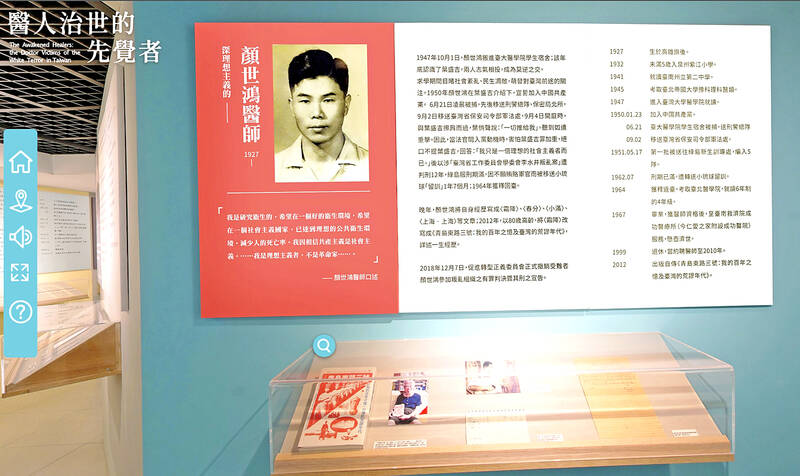Yen Shih-hung (顏世鴻), a renowned physician, author and victim during the White Terror era, has died at the age of 96.
The news of Yen’s death was confirmed yesterday by his niece, known by the penname Mi Kuo (米果), who said her uncle passed away peacefully on Friday.
The White Terror era refers to a period of political repression by the Chinese Nationalist Party (KMT) from 1949 to 1987.

Photo: screen grab from National Human Rights Museum’s Web site
Yen was born in October 1927 in Kaohsiung and at the age of three, his family moved to Fujian Province in China.
They returned to Taiwan after the Marco Polo Bridge incident in July 1937.
After the end of World War II, Yen studied at National Taiwan University’s (NTU) College of Medicine and in 1950, at the introduction of schoolmate Yeh Sheng-chi (葉盛吉), he joined the Communist Party in Taiwan, which at the time was governed by the KMT under Martial Law.
Due to this and another related case, Yen was sentenced to 12 years in prison and in May 1951, began serving his sentence on Green Island where he remained until 1962.
Yen in 2012 published an autobiography titled No. 3, Qingdao East Road: My Hundred-Year Memories and Taiwan’s Outrageous Era (青島東路三號:我的百年之憶 及台灣的荒謬年代).

Taiwan has received more than US$70 million in royalties as of the end of last year from developing the F-16V jet as countries worldwide purchase or upgrade to this popular model, government and military officials said on Saturday. Taiwan funded the development of the F-16V jet and ended up the sole investor as other countries withdrew from the program. Now the F-16V is increasingly popular and countries must pay Taiwan a percentage in royalties when they purchase new F-16V aircraft or upgrade older F-16 models. The next five years are expected to be the peak for these royalties, with Taiwan potentially earning

STAY IN YOUR LANE: As the US and Israel attack Iran, the ministry has warned China not to overstep by including Taiwanese citizens in its evacuation orders The Ministry of Foreign Affairs (MOFA) yesterday rebuked a statement by China’s embassy in Israel that it would evacuate Taiwanese holders of Chinese travel documents from Israel amid the latter’s escalating conflict with Iran. Tensions have risen across the Middle East in the wake of US and Israeli airstrikes on Iran beginning Saturday. China subsequently issued an evacuation notice for its citizens. In a news release, the Chinese embassy in Israel said holders of “Taiwan compatriot permits (台胞證)” issued to Taiwanese nationals by Chinese authorities for travel to China — could register for evacuation to Egypt. In Taipei, the ministry yesterday said Taiwan

Taiwan is awaiting official notification from the US regarding the status of the Agreement on Reciprocal Trade (ART) after the US Supreme Court ruled US President Donald Trump's global tariffs unconstitutional. Speaking to reporters before a legislative hearing today, Premier Cho Jung-tai (卓榮泰) said that Taiwan's negotiation team remains focused on ensuring that the bilateral trade deal remains intact despite the legal challenge to Trump's tariff policy. "The US has pledged to notify its trade partners once the subsequent administrative and legal processes are finalized, and that certainly includes Taiwan," Cho said when asked about opposition parties’ doubts that the ART was

If China chose to invade Taiwan tomorrow, it would only have to sever three undersea fiber-optic cable clusters to cause a data blackout, Jason Hsu (許毓仁), a senior fellow at the Hudson Institute and former Chinese Nationalist Party (KMT) legislator, told a US security panel yesterday. In a Taiwan contingency, cable disruption would be one of the earliest preinvasion actions and the signal that escalation had begun, he said, adding that Taiwan’s current cable repair capabilities are insufficient. The US-China Economic and Security Review Commission (USCC) yesterday held a hearing on US-China Competition Under the Sea, with Hsu speaking on